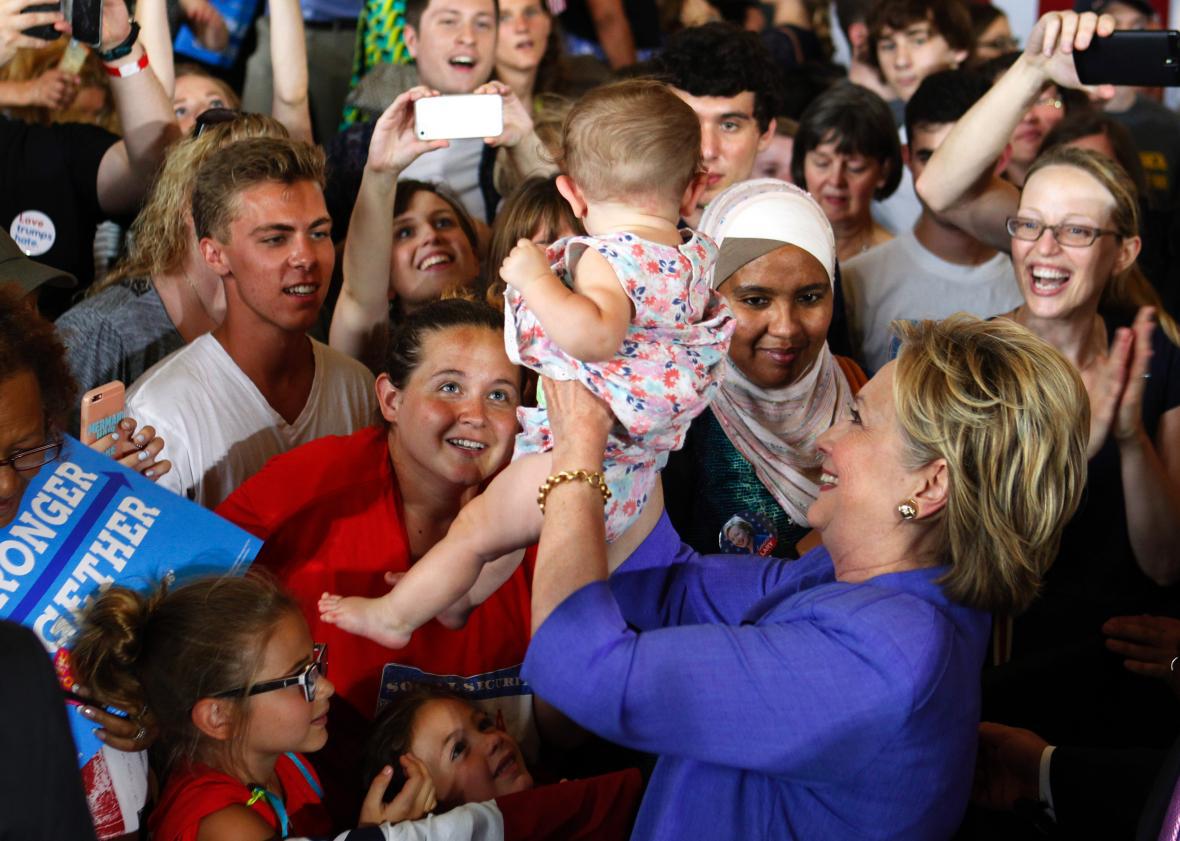If you’ve been enjoying this election’s surreal descent into moral and political anarchy, then by all means go check out the savage Twitter offensive Donald Trump has been busy waging against the Republicans who’ve distanced themselves from his flaming zeppelin of a candidacy. But if you need a palate-cleanser after our long, weird Columbus Day weekend, Hillary Clinton has you covered. The Democratic nominee just unveiled a new policy plan designed to put money in the pockets of families with children that could also serve as a serious poverty-fighting initiative. Best yet, it feels like something that could conceivably become law in the next four to eight years—which is sort of novel these days.
Here’s the news: Clinton is proposing to double the value of the child tax credit for children through the age of 4 to $2,000. At the same time, she would make it possible for low-income families who currently miss out on much of the credit to claim more of it. This sounds a little dry, but it could be an enormous help to some of the country’s neediest households.
Today, the child tax credit is a helpful bonus for middle-class families that excludes some of the poorest of the poor. Technically, it’s worth up to $1,000 per child. But many low-income households don’t earn enough to qualify for the full benefit, or can’t claim it at all, because of its refundability rules.
What does “refundability” mean? Basically, a family can claim a refundable tax break even if they don’t owe any more money to the IRS. Say your household qualified for a $1,000 tax credit but was only on the hook for $700 in actual taxes. If the credit were fully refundable, you’d get the remaining $300 as a check from the government. This may sound like a bizarrely roundabout way of essentially handing extra cash to struggling families, but refundable tax credits have their upsides. First, they submerge the safety net in the tax code, where it’s less likely to draw attention from angry conservatives. Second, they are an effective tool for tying benefits to how much adults work, which is how Americans seem to prefer their welfare state, for better or worse.
Right now, the child tax credit is partially refundable. Families with no tax liability can get back 15 percent of their earnings above $3,000, up to the full value of the credit. But if you make less than $3,000? You get nada. If that sounds perverse, remember that the credit was originally created in 1997 as a $500 break that wasn’t refundable at all. Over time, Washington has targeted it more toward the poor. But even now, economists estimate that only about 20 percent of its benefits go to tax filers earning less than $30,000 a year.
Clinton wants two big changes that would make the credit more valuable to the middle class and working poor alike. As I mentioned, she would up the credit’s value to $2,000 for kids 4 years old and younger. Second, she’s making more of the credit refundable for families with children of all ages by getting rid of that $3,000 threshold. Instead, families with no income-tax burden will be able to claim up to 45 cents of each dollar they earn up to the full value of the credit.
To see how this might work in practice, let’s take a hypothetical single mother with children ages 1 and 3 who earns $9,000 a year:
- Today, she’d be able to claim 15 percent of her income over $3,000—which comes out to $900.
- If Hillary Clinton got her way, this parent would be able to claim 45 percent of her entire $9,000 income. That’s $4,050. Because the credit is only worth $2,000 per child, she’d end up with $4,000 extra.
That is a very big difference for a struggling mother. Meanwhile, a parent who earned just $3,000 per year could qualify for a $1,450 check, whereas before they got nothing. That should give you a sense of why Vox’s Dylan Matthews, who spends an impressive amount of his waking hours thinking about anti-poverty policy, thinks this might be “among the most important policies [Clinton’s] announced during her entire presidential” campaign, and could help rectify the rise in deep poverty that followed Bill Clinton’s welfare reforms.
Moreover, it might be politically viable. Conservatives like Sens. Marco Rubio and Mike Lee have proposed their own sizable child credit expansions. And given that Clinton projects the cost of her proposal would be about $150 billion to $200 billion over a decade, it’s just inexpensive enough that you can imagine the White House bargaining it into an annual budget bill—especially if Trump crashes and burns down the Republican majority in the House. Now, back to that Trump tweetstorm …
